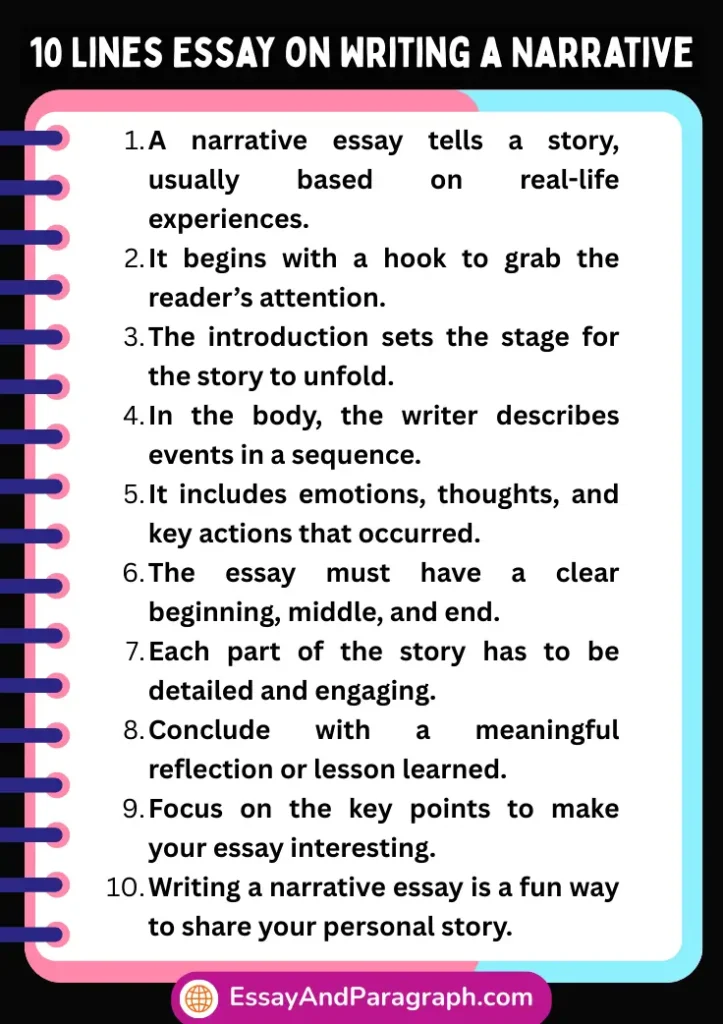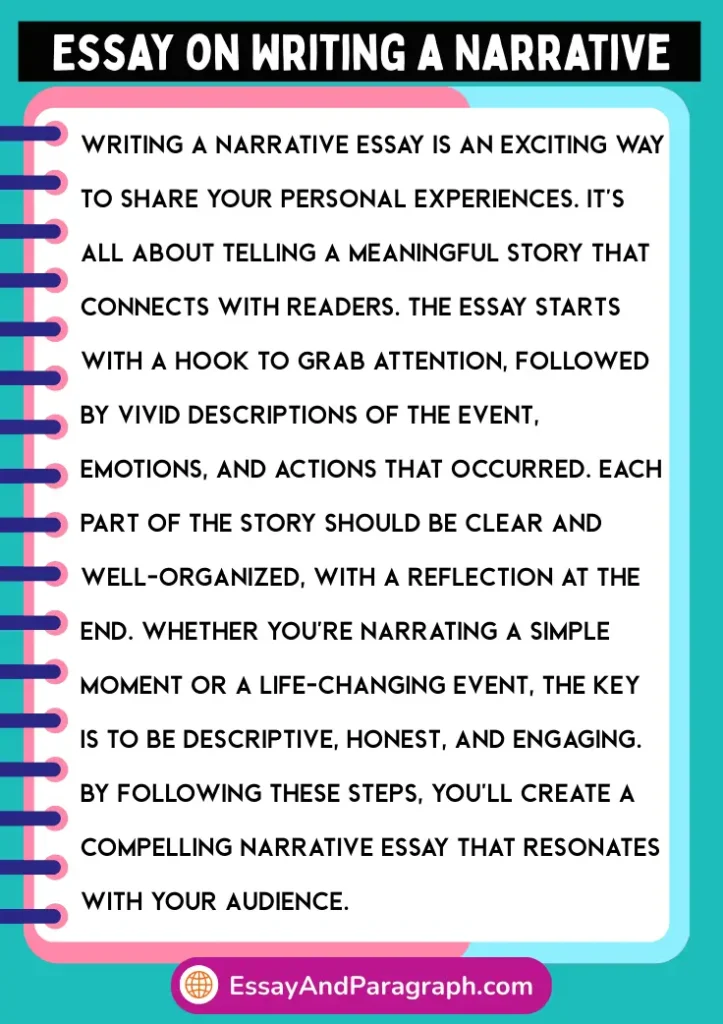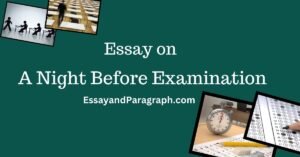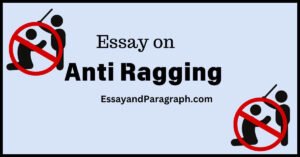Have you ever thought about telling a story in an essay? Well, that’s exactly what a narrative essay is! It’s your chance to share an experience, an event, or a moment that left an impact on you. Writing a narrative essay lets you be the storyteller, using your words to take readers on a journey. In this article, we will learn how to write a narrative essay and make your stories shine through words.
10 Lines Essay on Writing a Narrative for Students
A narrative essay tells a story, usually based on real-life experiences.
It begins with a hook to grab the reader’s attention.
The introduction sets the stage for the story to unfold.
In the body, the writer describes events in a sequence.
It includes emotions, thoughts, and key actions that occurred.
The essay must have a clear beginning, middle, and end.
Each part of the story has to be detailed and engaging.
Conclude with a meaningful reflection or lesson learned.
Focus on the key points to make your essay interesting.
Writing a narrative essay is a fun way to share your personal story.

Essay on Writing a Narrative Essay – 100 Words
A narrative essay is a story that conveys personal experiences, events, or moments that hold significance. It starts with an engaging introduction to hook the reader, followed by a detailed story with clear descriptions. In the body, the writer explains key events in a logical order, making sure to express emotions and thoughts during the experience. The conclusion wraps up the story, offering a reflection or lesson learned. Writing a narrative essay allows you to share your perspective and connect with readers through authentic storytelling, making it an enjoyable and valuable writing exercise.
Long Essay on Writing a Narrative Essay – 150-Words
Writing a narrative essay is about telling a story that reflects a personal experience. It usually starts with a captivating introduction to grab the reader’s attention, followed by a well-organized body. In the body, the writer describes events in sequence, using vivid language to make the story feel alive. Key interactions with others, emotions felt, and important moments are included to engage the reader. The goal is to make readers connect with your story and understand your perspective. At the end of the essay, there is often a reflection or lesson learned from the experience. The conclusion brings everything together, providing meaning to the events shared. Writing a narrative essay allows you to showcase your storytelling skills, express emotions, and share lessons that others can learn from. It’s a great way to practice creative writing while keeping the reader’s interest.
Short Essay on Writing a Narrative Essay – 200 words
A narrative essay is a form of writing that tells a personal story or experience. It usually starts with an attention-grabbing introduction, inviting the reader to read on. The main goal is to entertain or inform, all while using vivid details to describe events, settings, and emotions.
In a narrative essay, the writer focuses on key events that helped shape their experience. These events should be told in a clear order, from beginning to end, ensuring the story flows smoothly. Including sensory details, such as sights, sounds, and feelings, makes the story come alive. Moreover, the writer’s emotions and thoughts should be shared, helping the reader connect on a deeper level.
At the end, the essay concludes with a reflection or a lesson learned. This helps wrap up the story and leaves the reader with something to think about. Writing a narrative essay allows you to express your unique perspective and share your experiences with others, making it a wonderful exercise for both beginners and seasoned writers.
Essay on Writing a Narrative Essay – 250-Words
Writing a narrative essay allows you to share a personal experience or story with others. This type of essay is not just about telling what happened, but also about conveying the emotions, thoughts, and lessons learned during the experience. The goal is to make the reader feel as though they are experiencing the event along with you.
The essay begins with an introduction that grabs the reader’s attention. This could be a question, a surprising statement, or a vivid description that sets the stage for the story. Next, the body of the essay tells the story in chronological order, focusing on key moments and details that make the experience memorable. Using sensory details like sight, sound, and touch helps make the story more immersive and engaging. Including emotions and personal reflections is crucial to making the story relatable to the reader.
A strong narrative essay also focuses on interactions with others. Whether it’s a conversation or an important event shared with another person, these interactions can drive the plot forward and add depth to the story. The essay should have a clear beginning, middle, and end, allowing the reader to follow the journey.
Finally, the conclusion ties the story together by offering a reflection or insight gained from the experience. This helps the reader understand the deeper meaning behind the events shared. Writing a narrative essay is a creative way to communicate your experiences, reflect on them, and connect with readers on a personal level.
Long Essay on Writing a Narrative Essay – 500 words
Writing a narrative essay is an opportunity to share your personal experiences and connect with your readers. It’s like telling a story, but in essay format. This style of writing not only helps develop your storytelling skills, but also gives you the chance to reflect on events that have shaped your life. The purpose is not just to tell a story but also to convey the emotions, thoughts, and lessons you learned from the experience.
When writing a narrative essay, your first task is to create a compelling introduction. Start with a hook that draws the reader in, whether it’s an intriguing question, a surprising statement, or a thought-provoking observation. This will set the tone for the rest of your essay.
The body of your narrative essay is where you tell your story. Make sure to use clear and descriptive language so the reader can imagine the scenes you are describing. Include key moments of the event, your reactions, interactions with others, and the outcome. Use vivid sensory details like what you saw, heard, or felt. This brings the narrative to life and makes it more relatable.
Every good narrative essay has a clear structure, with a beginning, middle, and end. The beginning sets up the scene, introducing the situation or event that starts your story. The middle part delves into the experience itself, explaining the struggles, successes, or emotions you faced. Finally, the ending should provide a resolution, often with a reflection on what was learned or how the experience impacted you.
Concluding a narrative essay is just as important as starting it. Wrap up your story with a reflection that leaves the reader with something to think about. What did you learn from this experience? How did it change you or your perspective on life? This part of the essay allows you to share the deeper meaning behind the story.
Writing a narrative essay is a creative and introspective process. It helps you communicate a significant experience while honing your writing skills. Whether you are narrating a childhood memory, a moment of personal growth, or a lesson learned from a challenge, narrative essays allow you to share meaningful stories that others can connect with. Remember, the key is to be honest, descriptive, and thoughtful.
FAQs on Essay on Writing a Narrative
1. What makes a good narrative essay?
A good narrative essay tells an engaging story with clear details. It should have a strong introduction to hook the reader, a well-organized body that moves the story along, and a meaningful conclusion that reflects on the experience.
2. How do I start a narrative essay?
Start by introducing the scene or situation. Use a hook to grab the reader’s attention. This could be a question, a dramatic statement, or an interesting fact that draws the reader into the story.
3. Can I write a narrative essay about a personal experience?
Yes! In fact, personal experiences are the heart of narrative essays. Share a story from your life that was significant, whether it’s something funny, moving, or life-changing.
4. What should I avoid in a narrative essay?
Avoid being vague or overly general. Be specific about the events, settings, and emotions you describe. Also, don’t skip over the conclusion—make sure to reflect on the experience and what it taught you.
5. How long should a narrative essay be?
A narrative essay can vary in length. It can be short, around 200 words, or more extended, up to 500 or 1,000 words. The important thing is to tell your story clearly and with enough detail to engage your reader.
Top 5 Quotes on Writing a Narrative Essay
“A good story is not just about events, it’s about emotions that resonate with readers.”
“Narrative writing is the art of making your own life worth telling.”
“Every good story needs a beginning, middle, and end – and the reflection in between.”
“The key to writing a great narrative is capturing the details that make your story uniquely yours.”
“A narrative essay is where you reflect on your past, so others can understand your present.”

Summary Essay on Writing a Narrative
Writing a narrative essay is an exciting way to share your personal experiences. It’s all about telling a meaningful story that connects with readers. The essay starts with a hook to grab attention, followed by vivid descriptions of the event, emotions, and actions that occurred. Each part of the story should be clear and well-organized, with a reflection at the end. Whether you’re narrating a simple moment or a life-changing event, the key is to be descriptive, honest, and engaging. By following these steps, you’ll create a compelling narrative essay that resonates with your audience.



